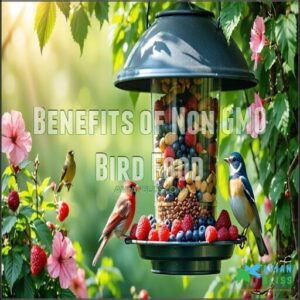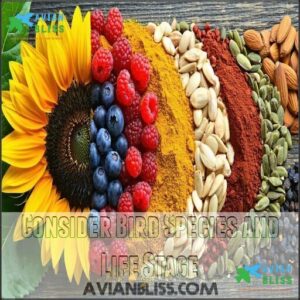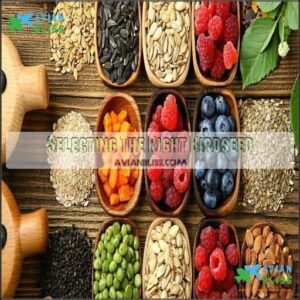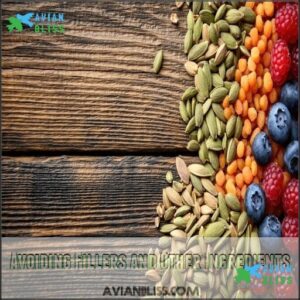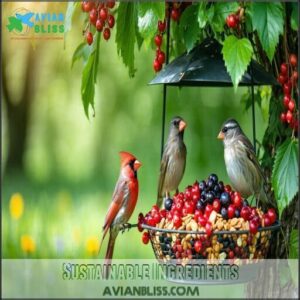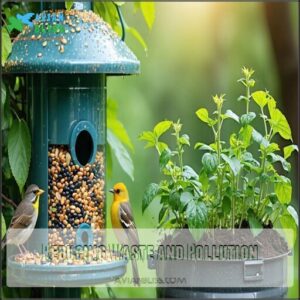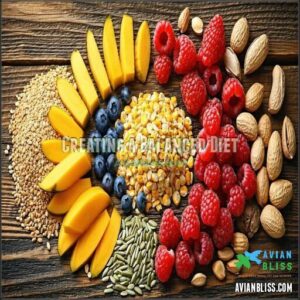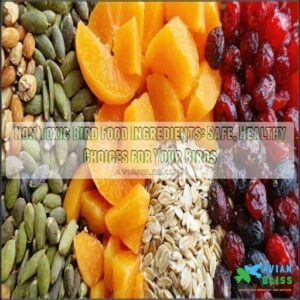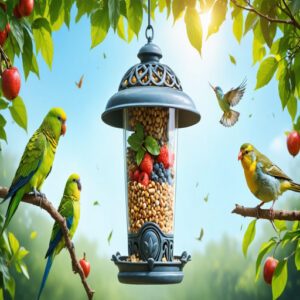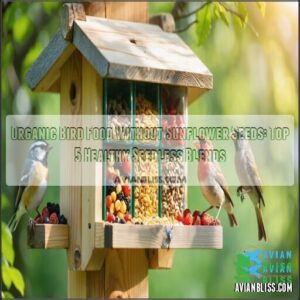This site is supported by our readers. We may earn a commission, at no cost to you, if you purchase through links.
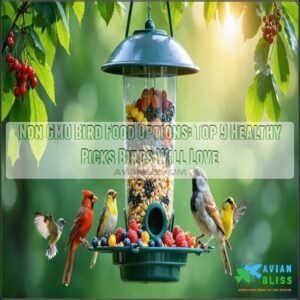
Start with trusted brands like Harrison’s Organic Bird Foods, which offer customized blends for small birds, parrots, or cockatoos. For wild favorites, Desert Valley’s non-GMO sunflower seeds and white millet are excellent.
Lafeber’s Nutri-Berries also combine balanced nutrition with no harmful additives. Always read labels to avoid fillers like corn or artificial ingredients.
Your feathered friends deserve the best, and non-GMO options guarantee they get clean, wholesome meals. Want to take it up a notch? Explore eco-friendly and organic blends next.
Table Of Contents
- Key Takeaways
- Benefits of Non GMO Bird Food
- Choosing Non GMO Bird Food
- Top 9 Non GMO Bird Foods
- 1. Harrison’s Organic Small Bird Food
- 2. Harrison’s Bird Food High Potency Superfine
- 3. Harrison’s Organic High Potency Bird Food
- 4. Harrison’s Bird Food High Potency Fine
- 5. Harrison’s Bird Food Pepper Lifetime Coarse
- 6. Desert Valley Sunflower Wild Bird Seed
- 7. Lafeber’s Parrot Nutri Berries Bird Food
- 8. Desert Valley White Millet Bird Seed
- 9. Lafeber’s Macaw Cockatoo Bird Food
- Eco Friendly Bird Food Options
- Creating a Balanced Diet
- Frequently Asked Questions (FAQs)
- What is the healthiest thing to feed birds?
- What is a good alternative to bird food?
- What is the cheapest way to feed wild birds?
- What is the best homemade bird food?
- How to store non-GMO bird food properly?
- What are common allergens in non-GMO bird food?
- How to transition birds to non-GMO food?
- How can bird food attract specific species?
- Are there seasonal bird feeding considerations?
- What are signs of poor-quality bird food?
- Conclusion
Key Takeaways
- Choose non-GMO bird food to ensure cleaner nutrition, prevent toxin exposure, and support birds’ vibrant plumage and stronger immunity.
- Avoid fillers like red millet, wheat, and corn that add waste and offer no nutritional value; opt for zero-filler blends.
- Store bird food in airtight containers away from heat and moisture to keep it fresh and prevent spoilage.
- Match bird food choices to species and life stage, using nutrient-rich seeds, fresh produce, and seasonal needs for balanced nutrition.
Benefits of Non GMO Bird Food
You’ll provide your birds with better nutrition and fewer toxins when you choose non-GMO food options for your feathered friends.
Non-GMO bird food ensures cleaner nutrition, vibrant plumage, and stronger immunity for healthier, happier feathered friends.
These natural formulations support stronger immune systems and healthier plumage while eliminating exposure to potentially harmful pesticides and artificial additives, which can lead to healthier plumage.
Improved Bird Health
Every bird deserves peak health without genetic modifications. Non-GMO bird food strengthens your feathered companions through naturally balanced nutrition.
When you choose healthy bird feed, you’ll notice:
- Enhanced plumage quality with richer colors and smoother texture
- Stronger immunity through essential nutrients birds naturally seek in the wild
- Improved gut microbiome supporting overall digestive health
Birds consuming non-GMO options typically display more energetic behavior and vibrant appearance. Their bodies process these clean ingredients more efficiently, leading to toxin reduction and better overall health. USDA Organic certification guarantees safer ingredients.
Non-GMO bird food boosts energy, enhances plumage vibrancy, and supports toxin-free, healthier birds with USDA Organic-certified, safer ingredients.
Your birds will thrive as nature intended, with stronger defenses against common avian illnesses, and enjoy better overall health through naturally balanced nutrition.
Increased Nutrient Absorption
Beyond improving overall health, non-GMO bird food substantially enhances nutrient absorption in your feathered friends.
When you choose organic options, you’re preserving the nutrient bioavailability naturally present in seed coats that often gets destroyed during conventional processing.
The gut microbiome thrives with specialized probiotics included in quality non-GMO formulations, supporting prime gut health and digestion. These foods typically undergo careful seed coat removal techniques that maintain valuable nutrients while making them easier to digest.
The natural enzyme stabilization in organic bird food guarantees digestive enzymes remain intact, allowing birds to extract maximum nutrition from each bite. Your birds’ gut bacteria flourish with these foods, creating an environment where grain digestibility improves dramatically—meaning they’ll absorb more nutrients from smaller portions, which is essential for prime gut health and overall well-being, including better digestion.
Reduced Exposure to Toxins
Choosing non-GMO bird food substantially shields your feathered companions from harmful substances that can devastate their delicate systems.
Birds, with their small size and rapid metabolism, are particularly vulnerable to toxins in conventional seed mixes. By selecting pesticide-free birdseed, you’ll provide toxin-free nutrition that supports your birds’ natural health.
Here’s how chemical-free bird food protects your avian friends:
- Eliminates dangerous pesticide residues that accumulate in tiny bodies
- Prevents exposure to harmful herbicides used in conventional farming
- Reduces mycotoxin contamination risks in stored seeds
- Maintains proper nutrient balance without synthetic additives
- Decreases potential allergen triggers in sensitive species
Choosing Non GMO Bird Food
You’ll need to match your bird food selection to your feathered friend’s specific needs, considering factors like species, size, and life stage.
Non-GMO options with USDA Organic certification offer better nutrition without harmful pesticides or fillers, supporting healthier immune systems and more vibrant plumage, which can be achieved with Non-GMO options.
Consider Bird Species and Life Stage
Birds at different life stages have unique nutritional requirements that directly impact their health.
When selecting non-GMO bird food, match it to both species and development stage for ideal care.
| Life Stage | Nutritional Needs | Recommended Food |
|---|---|---|
| Chick/Nestling | High protein (25-30%) | Soft, easily digestible formulas |
| Juvenile | Growth support (18-22% protein) | Gradual blends with varied seed size |
| Adult | Maintenance (12-18% protein) | Species-specific complete diets |
During breeding season, birds need extra protein and calcium, while molting birds require additional amino acids.
Seasonal needs also vary—winter calls for higher fat content to maintain body temperature.
You’ll notice healthier plumage and behavior when dietary needs perfectly match your bird’s current life stage.
Selecting The Right Birdseed
The right birdseed makes all the difference in attracting your favorite feathered visitors.
Match seed size to bird species—tiny nyjer for finches, larger sunflower seeds for cardinals.
Consider life stage requirements; molting birds need extra protein while nesting parents benefit from calcium-rich options.
When selecting nonGMO bird food, check for vacuum-sealed packaging with harvest dates to confirm freshness matters.
Store your natural bird feed in airtight containers away from heat and moisture.
Organic bird food offers superior nutrition without the harmful chemicals found in conventional seed varieties.
You can find various non-gmo options for your bird feeding needs.
Avoiding Fillers and Other Ingredients
While selecting quality non-GMO bird food, you’ll need to be vigilant about identifying unwanted fillers that offer no nutritional value.
Watch for these common fillers that birds typically reject:
- Red millet and wheat – often left untouched, creating waste and potential bacterial growth
- Corn-based fillers – frequently contaminated with toxic aflatoxins
- Rapeseed and canary seed – cheap ingredients used to bulk up mixes
Checking ingredient lists is vital for avoiding artificial additives and allergenic ingredients. Quality bird food should be free from preservatives like ethoxyquin, BHT, and BHA. Zero-filler blends guarantee all components are nutritious and actually consumed, saving you money while supporting better bird health.
Top 9 Non GMO Bird Foods
You’ll find these nine non-GMO bird foods offer superior nutrition without harmful chemicals or genetic modifications.
Each option provides essential nutrients that support your feathered friends’ health, from balanced omega fatty acids to protein-rich ingredients that promote vibrant plumage and increased energy.
1. Harrison’s Organic Small Bird Food
Harrison’s Organic Small Bird Food brings exceptional nutrition to your small birds.
With certified organic ingredients, this veterinarian-recommended option is packed with 18.5% protein and balanced Omega 3 & 6 fatty acids, promoting shiny feathers and vibrant health.
Its resealable bag maintains freshness, while the natural recipe supports year-round bird nutrition.
Small birds love the easy-to-digest pellets, which can be served dry or slightly moistened.
Though it’s a bit pricier, its high-quality organic certification makes it a dependable choice for bird lovers, providing exceptional nutrition and supporting vibrant health.
2. Harrison’s Bird Food High Potency Superfine
Harrison’s Bird Food High Potency Superfine is a game-changer if you’re feeding small birds like canaries, finches, or budgies.
This Organic High Potency Formula delivers perfectly sized USDA Organic Certified pellets packed with 18.5% protein and balanced omega fatty acids.
It’s not just parrot food pellets; it’s crafted for small birds needing a nutritional boost during molting, growth, breeding, or recovering from illness.
With human-grade ingredients like hulled millet, barley, and sunflower kernels, this Superfine Formulation supports year-round health.
There are no fillers, artificial colors, or harsh processing—just pure, organic goodness.
To maximize potency benefits, seal the bag tightly and use it within eight weeks for the freshest nutrition.
Ideal for nurturing vibrant, energetic feathered friends, with a focus on USDA Organic Certified pellets and balanced omega fatty acids.
3. Harrison’s Organic High Potency Bird Food
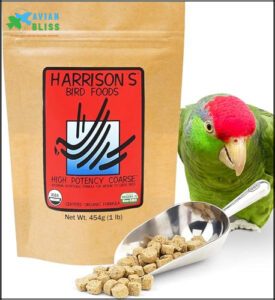
For medium to large feathered companions, Harrison’s Organic High Potency Bird Food is a standout among organic bird food options.
It’s crafted with USDA Organic certification, ensuring clean ingredients free from harmful chemicals. Formulated by avian experts, this Organic High Potency Formula delivers balanced omega fatty acids, essential vitamins, and protein content through wholesome grains and legumes.
This premium parrot food pellet is perfect for cockatoos, large conures, eclectus, macaws, and pionus. Pet owners often notice dramatic improvements in their bird’s plumage vibrancy and energy after switching to this high-quality diet.
While its price is higher, the focus on ingredient sourcing and human-grade standards makes it worthwhile.
For superior results, start with six months of High Potency before switching to Harrison’s Lifetime Formula. Always check the USDA Organic label for assurance of exceptional quality.
4. Harrison’s Bird Food High Potency Fine
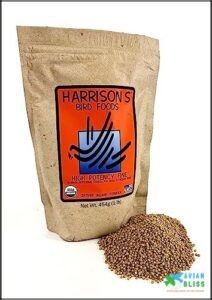
If your feathered friend prefers a finer texture, Harrison’s High Potency Fine is a fantastic choice for small to medium birds like cockatiels, lovebirds, parakeets, and conures.
This certified organic bird food brings together the perfect balance of Omega 3 & 6 fatty acids with human-grade grains and legumes.
It’s specially crafted for molting periods, weight management, or recovery, providing 18.5% protein and 12% fat.
The fine grind guarantees easy feeding for smaller beaks, while the mild smell reduces fuss when introducing it.
Free from fillers or artificial additives, this healthy bird food supports shiny plumage and energetic activity.
Gradually mix with current food to help picky eaters adjust to this non-GMO bird food gem!
5. Harrison’s Bird Food Pepper Lifetime Coarse
If your parrot enjoys a little kick, the Pepper Lifetime Coarse formula might just spice things up.
Crafted for medium to large parrots, this organic bird food delivers a unique spicy formula featuring dried red peppers.
Its coarse pellets promote better chewing, while organic certification guarantees it’s pure and chemical-free.
Made with wholesome ingredients like hull-less barley, toasted soybeans, and whole corn, this non-GMO bird food supports long-term health.
It’s especially beneficial for parrots switching from High Potency diets or showing papillomatosis symptoms.
At first, your parrot may hesitate, but persistence often wins.
Offering year-round, healthy bird food options suited to your bird’s size and taste—while guaranteeing proper nutrition—is where Harrison’s excels.
It’s organic certification at its best!
6. Desert Valley Sunflower Wild Bird Seed
Desert Valley Sunflower Wild Bird Seed is a fantastic pick for attracting vibrant songbirds to your yard.
Packed with nonGMO sunflower seeds, it’s an organic wild bird food option loved by Cardinals, Finches, Blue Jays, and Chickadees. The high seed oil content offers superior Sunflower Nutrition, helping birds thrive with energy-rich fats.
With three convenient sizes (3lb, 5lb, 10lb) in resealable bags, this nonGMO birdseed stays fresh longer. Its shell-free benefits mean less mess and no unwanted sprouting under feeders.
Whether you’re sprinkling it on your deck or filling your favorite feeder, it’s perfect for Attracting Birds while keeping your yard tidy.
- Benefits:
- High Seed Oil Content for energy.
- Non-GMO Assurance.
- Mess-free, Shell-Free Benefits.
- USA-grown wild bird seed.
7. Lafeber’s Parrot Nutri Berries Bird Food
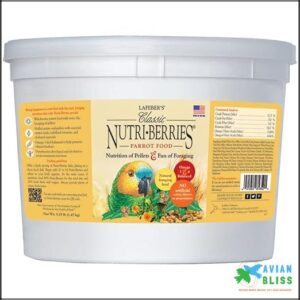
Lafeber’s Nutri-Berries are your go-to for interactive, nutritious treats designed by veterinarians to support Parrot Foraging Behavior. Made with human-grade, non-GMO ingredients, these bite-sized spheres pack balanced Omega 3 & 6 fatty acids, antioxidants, and essential nutrients into every berry.
They’re not just food—they’re fun! Birds like African Greys, Caiques, and Conures love holding these treats, which double as engaging beak exercise and a boredom buster.
Unlike regular pellets, NutriBerries mimic natural foraging while delivering complete nutrition, making them a standout in organic bird food. To guarantee a balanced diet, consider high quality parrot food.
With a 100% satisfaction guarantee, they pair perfectly with fresh produce in a varied diet. Lafeber’s Nutri-Berries Benefits go beyond basic nutrition—they bring joy and health to every meal.
8. Desert Valley White Millet Bird Seed
Desert Valley White Millet Bird Seed is a favorite choice among bird lovers who prioritize quality and health.
Packed with protein, fiber, magnesium, B vitamins, and calcium, it offers excellent Millet Nutrition to support your birds’ well-being.
This pesticide-free birdseed, sourced from local American farms, is triple-cleaned for superior quality, ensuring less debris and dust for easy handling.
Smaller ground-feeding birds such as cardinals, finches, sparrows, and doves seem to relish every bite, making it a popular wild birdseed option.
Although its resealable bags (available in 3lb, 5lb, and 10lb sizes) tend to feel flimsy during shipping, the seed’s freshness and taste earn rave reviews.
For healthy birdseed options, this natural birdseed doesn’t disappoint.
9. Lafeber’s Macaw Cockatoo Bird Food
In terms of top-tier nutrition for macaws and cockatoos, Lafeber’s Macaw Cockatoo Bird Food stands out among nonGMO bird food brands.
Crafted with care on the Lafeber family farm, this mix combines nonGMO ingredients, whole hulled seeds, and 26% pellets for ideal nutrient balance.
The blended texture promotes natural foraging behavior, keeping birds engaged while supporting foot health.
Three stand-out features include:
- Real tropical fruits: Pineapple, mango, and papaya enhance appeal.
- Balanced diet: Nutritional benefits include essential vitamins and minerals.
- Premium ingredient quality: No artificial additives or fillers.
Perfect for large birds, this option brings together flavor, texture, and organic ingredients to guarantee your bird thrives with every bite.
Eco Friendly Bird Food Options
When you choose eco-friendly bird food, you’re supporting sustainable farming practices that protect the environment.
Look for options with biodegradable packaging and natural, non-GMO ingredients to minimize waste and pollution.
Sustainable Ingredients
Let’s talk about the heart of eco-friendly bird feed: sustainable ingredients. They’re not just better for your feathered friends, but also kinder to the planet.
Look for bird food with these practices:
- Farm-direct sourcing: Supports small farms while ensuring premium, traceable ingredients.
- Locally grown seeds: Cuts transportation emissions and backs sustainable communities.
- Water conservation: Preserves ecosystems while reducing water waste during farming.
- Regenerative farming: Improves soil health, promotes biodiversity, and creates nutrient-rich seeds.
By choosing sustainable bird feed, you’re supporting healthy habitats and nutritious diets. You can find options for eco-friendly bird feed online.
Birds benefit from cleaner, natural food, and you’re helping build a safer, eco-friendly world—one feeder at a time!
Biodegradable Packaging
Beyond sourcing sustainable ingredients, bird food brands are redesigning how they package products to help the planet.
Compostable packaging is leading the change, with options like seed paper that can sprout flowers when planted.
Innovative materials such as algae packaging and mushroom packaging also provide ecofriendly ways to protect bird seed while reducing waste.
Biodegradable packaging guarantees minimal environmental impact, helping wildlife thrive, and many brands now offer sustainable packaging options, like recycled packaging, proving you can feed birds responsibly without harming their ecosystem.
Reducing Waste and Pollution
After exploring biodegradable packaging, let’s consider how you can reduce overall waste while feeding birds.
Sustainable practices like composting birdseed and choosing eco-friendly feeders protect the environment birds rely on.
By using recycled or compostable packaging and minimizing feeder waste, you actively support cleaner ecosystems.
Even composting bird droppings can enrich your garden’s soil while reducing runoff.
One way to save money is to explore alternative bird food.
- Opt for feeders made from recycled ocean plastic or sustainable materials.
- Compost unused birdseed or droppings to create natural fertilizer.
- Incorporate biodegradable packaging into your supplies.
- Select locally sourced bird food to lower transportation emissions.
- Avoid feeders or setups prone to excessive seed or waste spillage.
Together, these steps create cleaner spaces for birds and healthier habitats overall.
Creating a Balanced Diet
Creating a balanced diet for birds guarantees they get the nutrients needed for vibrant health and energy.
By combining non-GMO bird food with fresh produce and avoiding harmful fillers, you can provide everything they need in a natural, safe way.
Mixing Bird Food With Fresh Produce
Mixing fresh produce with non-GMO bird food boosts bird nutrition while mimicking their natural diet.
Stick to safe options like carrots, kale, or berries, making fresh produce about 20-30% of their diet.
Avoid toxic produce like avocado and guarantee proper preparation methods, such as washing thoroughly and removing apple or cherry seeds.
Seasonal produce adds variety, and steaming vegetables can make them easier to eat. Consider using a specialized produce mix to guarantee a balanced diet.
Start small and balance portions to keep your feathered friend happy, healthy, and full of energy!
Providing a Variety of Nutrients
For a healthier, happier bird, focus on nutritional variety by combining different food types.
Birds thrive on diverse diets that mimic natural habitats.
- Seed Diversity: Mix millet, flax, and NonGMO sunflower seeds for balanced nutrition.
- Fruit Additions: Offer berries, apple slices, or melons packed with vitamins.
- Nut Blends: Add unsalted almonds, walnuts, or pecans for healthy fats.
- Grain Variety and Protein Sources: Include cooked quinoa, oats, or brown rice.
A variety of foods guarantees your bird stays energized, vibrant, and thriving.
It’s also important to reflect on fresh foods for parrots to provide essential hydration and antioxidants.
Avoiding Toxic Substances and Fillers
Bird food’s quality determines your bird’s well-being.
Avoid fillers like wheat or red millet that attract pests and cause waste. Opt for pesticide-free birdseed with zero fillers to guarantee safety.
Look for high-quality, non-GMO bird food to avoid toxic substances and artificial additives. Store seeds in cool, dry places to stop mold growth.
| Toxic Substances | Avoid These Fillers |
|---|---|
| Aflatoxins | Wheat |
| Pesticides | Red Millet |
| Artificial Additives | Sorghum |
| Preservatives | Rapeseed |
| Fungicides | Corn |
Frequently Asked Questions (FAQs)
What is the healthiest thing to feed birds?
Feed birds organic, non-GMO food with nutrient-rich seeds, fruits, and nuts.
Prioritize blends with USDA Organic certification to avoid toxins and fillers.
Add fresh fruits, veggies, or specialized pellets for balanced nutrition and vibrant health.
What is a good alternative to bird food?
Imagine a picnic for birds—vegetables, fruits, plain cooked rice, or oats work great.
Add unsalted nuts or seeds for extra nutrients.
Avoid processed foods or seasonings to keep their meals safe and nutritious.
What is the cheapest way to feed wild birds?
Stock up on bulk seeds like black oil sunflower or millet for cheap, nutrient-rich options.
Skip pre-packaged mixes—many contain fillers birds won’t eat.
Add kitchen scraps like fruit or bread, and use homemade feeders.
What is the best homemade bird food?
Whipping up homemade bird food is easy-peasy.
Mix sunflower seeds, oats, chopped nuts, and dried fruits.
Add peanut butter or suet to bind it.
This blend supports energy, gut health, and vibrant plumage.
How to store non-GMO bird food properly?
Store non-GMO bird food in a cool, dry place in airtight containers to maintain freshness and prevent mold or pests.
Avoid sunlight and high humidity, and check for spoilage regularly to guarantee quality.
What are common allergens in non-GMO bird food?
It’s ironic that even “natural” bird food can contain allergens like soy, wheat, peanuts, or artificial dyes.
Always check ingredients for these sensitivities to protect your feathered friends from unwanted reactions or discomfort.
Ensure the ingredients are free from common allergens like peanuts to keep your birds safe.
How to transition birds to non-GMO food?
Switch gradually by mixing small amounts of non-GMO food with your bird’s current diet.
Increase the ratio weekly.
Watch for changes in behavior or droppings, and make certain water stays fresh to aid digestion.
How can bird food attract specific species?
Choose seed blends matching birds’ diets, like nyjer for finches or safflower for cardinals.
Use feeders designed for specific species’ sizes and eating habits.
Place food near vegetation or water to attract them naturally.
Are there seasonal bird feeding considerations?
Think of seasons as nature’s recipe for feeding birds.
In winter, offer high-fat foods like suet.
Spring calls for protein-packed seeds to support nesting.
Summer needs hydrating fruits.
Fall’s about fueling up for migration.
What are signs of poor-quality bird food?
Poor-quality bird food often has moldy or dusty seeds, unpleasant odors, or visible debris like twigs.
Watch for unnatural colors, fillers like wheat or corn, and expired packaging dates—these can harm your bird’s health.
Conclusion
Imagine a puzzle with each piece essential for the whole picture—that’s your bird’s diet.
Choosing non-GMO bird food options guarantees your feathered friend gets clean, nutrient-rich meals free from toxins. Brands like Harrison’s and Lafeber’s provide balanced blends suited to specific species, while Desert Valley offers excellent wild bird choices.
Pay attention to labels, avoid fillers, and combine seeds with fresh produce for variety. A thoughtful diet keeps your birds healthy, happy, and thriving, which is why selecting the right food is a critical decision.
- https://wildbirdstore.com/2019/05/28/birds-life-stages-defined/
- https://www.birdfy.com/blogs/blogs/the-life-cycle-of-a-bird-knowing-about-its-life-cycle-from-egg-to-flight?srsltid=AfmBOopOBaav3ltN1tE5EglmAx2CGcRXgoVeWd_vxjnKSDiUIH3R1wry
- https://blog.mybirdbuddy.com/post/bird-life-expectancy
- https://byjus.com/biology/bird-life-cycle/
- https://www.birdspot.co.uk/identifying-birds/the-life-cycle-of-a-bird

